360° Video footage from the participant-produced film entitled, “Enjoying time in the jungle and in the river.”
Produced by: Awa Nampahue and Manuel Nampahue
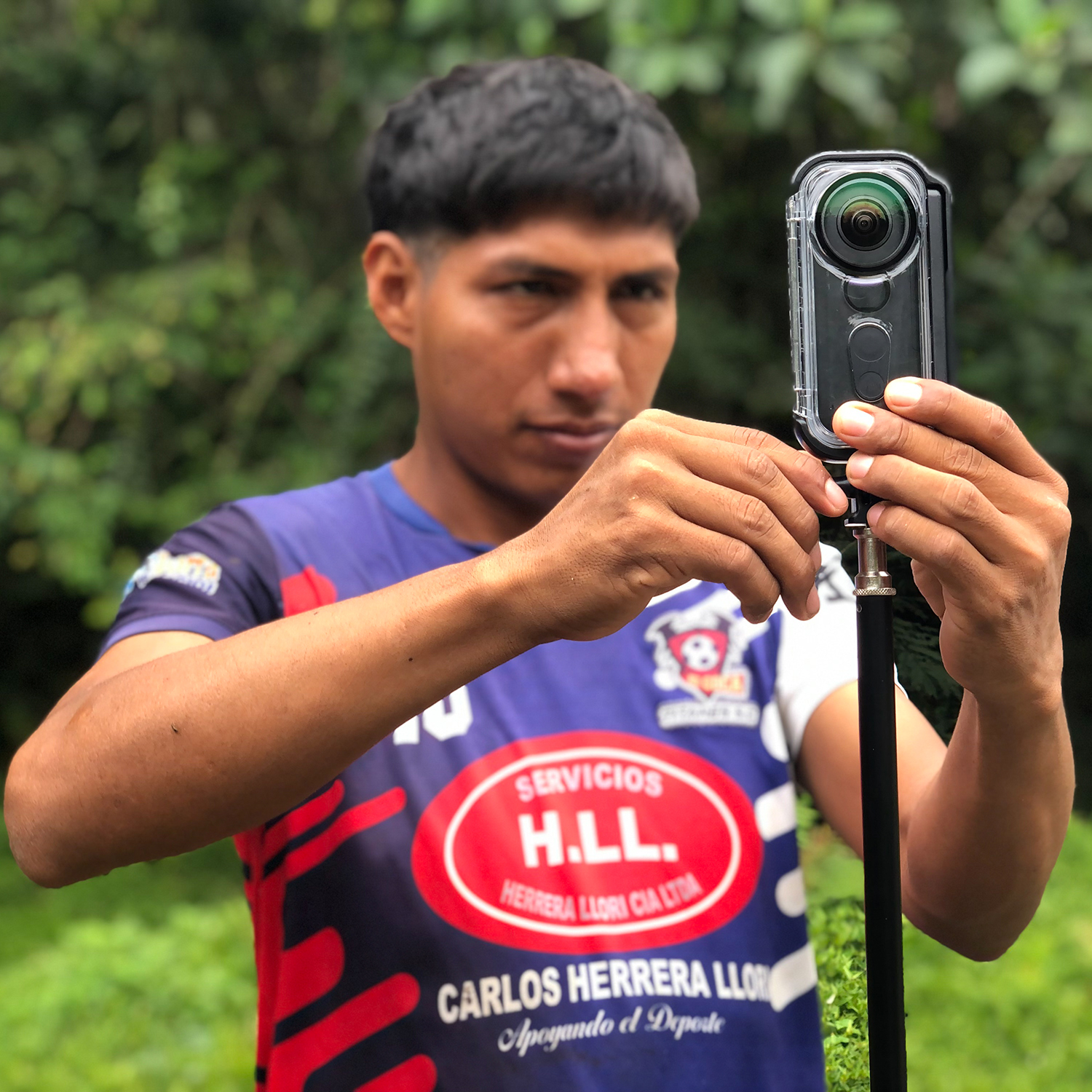
A Quick Note about 360 Films…
To enjoy the full immersive experience, we recommend using a head-mounted display (HMD), if you have access to one. Please click here to connect with our full playlist of all participant films included below.
You may also view the 360 films below using your computer, tablet, or mobile device. Click and drag around the video to appreciate the immersive nature of the media.
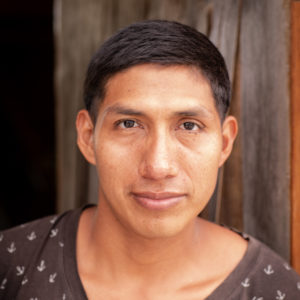
Awa Mauricio Nampahue Kaiga
Awa is 29 years old. He lives in the community of Dicaro located in Conocaco county in the province of Orellana. In the community, he lives with his wife and their 3 children. During his free time, he likes to go for a walk around his farm, or when he has the opportunity, he likes to go out to the city to walk with his family. He currently works guiding a group of researchers in the jungle around his community. His interest in producing multimedia content lies in safeguarding memories of both his culture and his family.
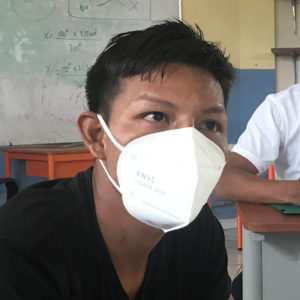
Mimpadey Manuel Nampahue Buyuba
Manuel elected not to continue participating in the research study after his first 360 video production with Awa. He did not offer an explanation as to why.
English: Enjoying time in the jungle and in the river
When we go to the jungle, we come to know the animals, lagoons, rivers, waterfalls and people. Manuel and I went to the jungle to see the salt licks. We also found animal tracks and crossed the river. We also enjoyed with the children playing in the river. We all had fun together.
Español: Disfrundando en la selva y en el río
Cuando vamos a la selva conocemos a los animales, lagunas, ríos, cascada y personas. Manuel y yo fuimos a la selva para ver los saladeros. Encontramos también huellas de los animales y cruzamos el río. Disfrutamos también con los niños en el río. Todos nos divertimos juntos.
Wao Tededo: Tote inani omere tono epene
Tano goke ponete ate omere gokipa oigairi awaire epene teñataa ganka ate ponete gokimi. Manuel tono boto gotamonapa omere ate ebano ii ante ocamone onopo empo adike epene oo pentate pote inike oke emete anomai adike wiñenani inanite Tote inani. Tomamoni tote inanitapa.
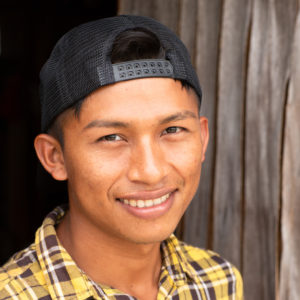
Karewa Ruben Tocari Coba
Karewa is 25 years old. He lives in the community of Dicaro with his wife and son. He is currently studying Business Administration at Instituto Superior Tecnológico CRECERMAS (ISTEC Technical Institute) during the weekends in the city of Lago Agrio. His interest in producing both photography and video began with the intention of sharing his culture so that people can learn about his culture.
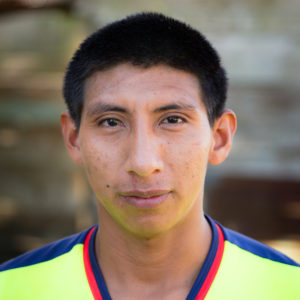
German Nampahue Kaiga Omehuai
German, 27 years old, lives with his parents and his brothers 1.5 km outside the community of Dicaro. In his spare time, he helps his brothers with their homework and plays sports. He is currently studying Food Engineering at Instituto Superior Tecnológico CRECERMAS (ISTEC Technical Institute) during weekends in the city of Lago Agrio. His interest in creating photos and videos reflects his interest in using it to promote tourism in h is community.
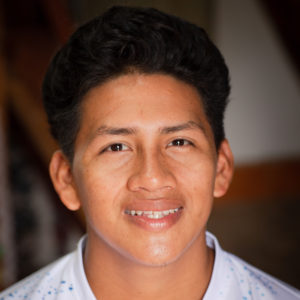
Jose Omehuai
Jose is 23 years old. He lives with his wife and daughter in the community of Dicaro within Yasuní National Park. His free time is spent with his family. He currently collaborates with the community high school as a substitute teacher. His interest in creating multimedia content stems from his desire to share with the world through digital platforms about the Waorani nationality and, by doing so, support tourism in his community.
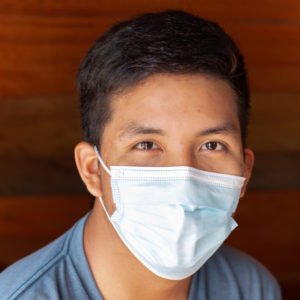
Henry Tebani Omehuai Onguinea
Henry, 19, lives in the community of Dicaro in Cononaco county. He lives with his parents. He spends his free time with his family helping them with different activities at home and also traveling and seeing new places. He also enjoys creating content of various types to upload to his personal YouTube account. At the moment, he is finishing his second year of high school. He was motivated to be part of the workshop to learn more about the use of cameras, both traditional and 360.
English: Dicaro: Sports and Culture
In August 2021, Dicaro participated in several cultural and sporting events in the city of Tiputini. We spent time with people of various nationalities, proudly representing our Waorani nationality. We won first place in dance and in women’s soccer. We also scored a close final in men’s soccer. It was a fun-filled celebration.
Español: Dicaro: Deporte y Cultura
En agosto de 2021, Dicaro participó en varios eventos culturales y deportivos en la ciudad de Tiputini. Compartimos con gente de varias nacionalidades, dejando el alto nuestra nacionalidad Waorani. Ganamos el primer lugar en la danza y en el fútbol femenino, además tuvimos una final reñida de fútbol masculino. Fue una fiesta llena de diversión.

Awa Mauricio Nampahue Kaiga
Awa is 29 years old. He lives in the community of Dicaro located in Conocaco county in the province of Orellana. In the community, he lives with his wife and their 3 children. During his free time, he likes to go for a walk around his farm, or when he has the opportunity, he likes to go out to the city to walk with his family. He currently works guiding a group of researchers in the jungle around his community. His interest in producing multimedia content lies in safeguarding memories of both his culture and his family.
English: Venturing into the jungle and observations
My brothers and I left by bus to go to the jungle. We went to visit my family in the jungle. My brother and i went to the jungle to hunt animals. We observed and listened to the voices of the animals. In the end, we left the jungle, and my dad prepared the peccary (wild boar) to cook. After eating, we returned to the house by car.
Español: Salida en la selva y observaciones
Mis hermanos y yo salimos en bus para ir a la selva. Fuimos a visitar a mi familia en la selva. Mi hermano y yo fuimos a la selva para cazar animales. Nosotros observamos y escuchamos las voces de los animales. Al final salimos de la selva y mi papá prepara el sajino para cocinar. Después de comer regresamos a la casa en carro.
Wao Tededo: Gote omere akimini ante impa
Boto toniñarani tono gobopa awotore omere goke. Gote ankete boto wempo weka omere. Monakaya omere gotamonapa. Monanto eyecontamonapa oigaire anani eyetamonanpa. Dee baronte iya enmente omere ponte boto wempo enonke kekanpa oinga. Dee baronte ken tinya wemente pontamonipa ocone awotore.

Karewa Ruben Tocari Coba
Karewa is 25 years old. He lives in the community of Dicaro with his wife and son. He is currently studying Business Administration at Instituto Superior Tecnológico CRECERMAS (ISTEC Technical Institute) during the weekends in the city of Lago Agrio. His interest in producing both photography and video began with the intention of sharing his culture so that people can learn about his culture.
English: Dicaro: Cultural conservation in Yasuní jungle
One morning, my family goes out to our farm in the jungle. We are going to get firewood and yucca. The children help us and play. They come out of the jungle collecting firewood and yucca. At home, my mom peels, cooks, and chews yucca to make chicha. The next day, she serves us chicha to drink as a family.
Español: Dicaro: Conservación cultura en la selva Yasuní
Una mañana, mi familia sale a ala chacra en la selva. Vamos a sacar leña y yuca. Los niños nos ayudan y juegan. Salen de la selva cogiendo leña y yuca. En la casa, mi mamá pela, cocina y mastica la yuca para preparar chicha. El día siguiente, ella nos sirve la chicha para tomar en familia.

Jose Omehuai
Jose is 23 years old. He lives with his wife and daughter in the community of Dicaro within Yasuní National Park. His free time is spent with his family. He currently collaborates with the community high school as a substitute teacher. His interest in creating multimedia content stems from his desire to share with the world through digital platforms about the Waorani nationality and, by doing so, support tourism in his community.

Henry Tebani Omehuai Onguinea
Henry, 19, lives in the community of Dicaro in Cononaco county. He lives with his parents. He spends his free time with his family helping them with different activities at home and also traveling and seeing new places. He also enjoys creating content of various types to upload to his personal YouTube account. At the moment, he is finishing his second year of high school. He was motivated to be part of the workshop to learn more about the use of cameras, both traditional and 360.
English: Everyday family fishing
As you can see, we help each other to prepare fish for dinner by removing the scales to prepare and take it to the kitchen. It is a moment in which we share with our family in the Waorani community of Dicaro, all for the well-being of our children who we continue nourishing day by day.
Español: La pesca de la familia de cada día
Como pueden ver nosotros ayudamos entre todos para poder preparar pescados para la merienda., sacando las escamas ya para prepararlo y llevarlo a la cocina. Es el momento en que compartimos con nuestra familia en la comunidad Wao de Dicaro. Todo por el bienestar de nuestros hijos y seguir alimentandos dia a dia.

German Nampahue Kaiga Omehuai
German, 27 years old, lives with his parents and his brothers 1.5 km outside the community of Dicaro. In his spare time, he helps his brothers with their homework and plays sports. He is currently studying Food Engineering at Instituto Superior Tecnológico CRECERMAS (ISTEC Technical Institute) during weekends in the city of Lago Agrio. His interest in creating photos and videos reflects his interest in using it to promote tourism in his community.
*Please note: This is a traditional video (not 360) and will not reproduce well in a headset.
English: The path to the salt lick
I walk to the salt lick to see parakeets, parrots, macaws, and guans (ground birds).
*Note: Salt licks are walls of clay full of minerals where different animals come to eat the minerals in order to neutralize the toxins in their diets.
Español: El Camino que va hacia en el Saladero
Camino hasta el saladero para ver a los pericos, loritos, guacamayos, y pavas.
*Nota: Los saleros son paredes de arcilla llenas de minerales donde diferentes animales acuden a comer los minerales para neutralizar las toxinas en sus dietas.

Jose Omehuai
Jose is 23 years old. He lives with his wife and daughter in the community of Dicaro within Yasuní National Park. His free time is spent with his family. He currently collaborates with the community high school as a substitute teacher. His interest in creating multimedia content stems from his desire to share with the world through digital platforms about the Waorani nationality and, by doing so, support tourism in his community.

Henry Tebani Omehuai Onguinea
Henry, 19, lives in the community of Dicaro in Cononaco county. He lives with his parents. He spends his free time with his family helping them with different activities at home and also traveling and seeing new places. He also enjoys creating content of various types to upload to his personal YouTube account. At the moment, he is finishing his second year of high school. He was motivated to be part of the workshop to learn more about the use of cameras, both traditional and 360.
*Please note: This is a traditional video (not 360) and will not reproduce well in a headset.
English: Waorani Culture
Culture for us is very important. We know who we are. As you can see in the video, the songs narrate how the grandparents and family lived before. Young people today represent what marriages were like at the chicha, chonta, yucca, and chucula parties. Our language is very important and we have not forgotten it until now. The Waorani nationality still maintains its customs in the Waorani community of Dicaro.
Español: La Cultura Waorani
La cultura para nosotros es muy importante. Sabemos quienes somos. Como puede ver el video las canciones narran como vivían antes los abuelos y la familia. Los jóvenes hoy en actual representan como eran los matrimonios en la fiestas de chicha, de chonta, yuca, y chucula. Nuestro idioma es muy importante y no lo hemos olvidado hasta ahora. Qué la nacionalidad Waorani aún mantiene las costumbres, en la comunidad Waorani de Dicaro.
